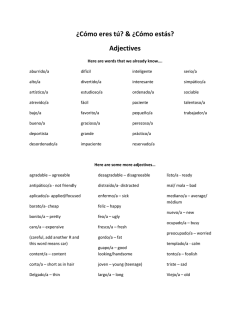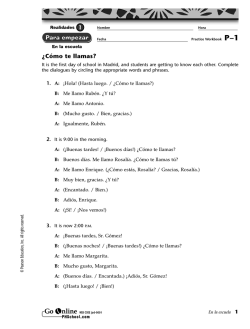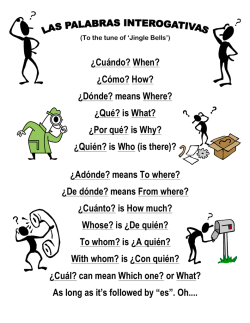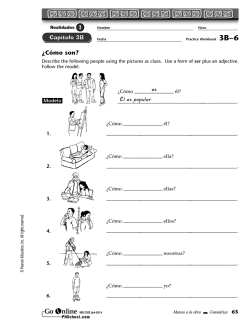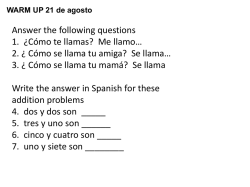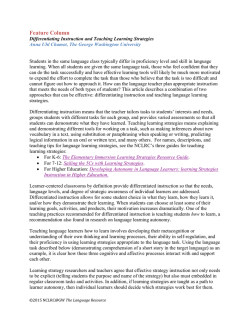
Cómo te llamas - Team81-Homework - home - Wikispaces
¿Cómo te llamas?_______________________________ ¿Cuál es la fecha de hoy?________________ Saludos y Despedidas Greetings and Farewells Greetings, earthling!: Let’s write some simple phrases in Spanish that can begin a conversation. What is the situation? Familiar (informal) Formal What would you say when meeting someone around your age (or younger)? What would you say when meeting someone older than you? 1a.) Spanish phrase: How you would use it 1.) Ho__a To greet someone informally, someone _____________ your age (or younger) any ______________________ of day. 2.) Bu__n__s dí__s To greet someone formally, someone ________________ than you, in the ____________________________________. 3.) Buen__s ta__des Formally, in the ________________________________________. 4.) Buen__s noc__es Formally, in the ________________________________________. 5.) Se__or To address a __________________________________________. 6.) Se__orito To address a __________________________________________. 7.) Se__o__a To address a __________________________________________. 8.) Se__o__ita To address an _________________________________________. 9.) ¿Qué t__l? To ask ______________________________________ how s/he is. 10.) ¿Có__o es__ás? To ask someone around your ___________________________how s/he is. 11.) ¿Q__é pasa? More ____________________ to ask someone how s/he is. 12.) Bi__n, gr__ci__s To tell anyone that_________________ are _______________________. 13.) M__y bi__n To tell anyone that_________________ are _______________________. 14.) A__í así To tell anyone that _________________ are _______________________. 15.) ¡No m__y bi__n! To tell anyone that__________________ are _______________________. 16.) ¿Có__o te llama__? To ____________ the ____________ of someone around your_______________. 17.) ¿Có__o __e llama? To ____________ the ____________ of someone__________________ than you. 18.) Me __am__ To _____________ anyone your ____________________________. 19.) M__cho g__sto To tell anyone that you are ___________________ to ___________________ him/her. 20.) P__r fa__or To ask or say __________________________________________. 21.) Gr__ci__s To_____________________ anyone. 22.) De n__d__ To tell anyone s/he is _____________________________________. 23.) Te__go que ir__e To tell anyone that you ___________________________ leave. 24.) C__ao To say ________________________ to someone _________________ your age. 25.) A__iós To say ________________________ to someone __________________ than you. 26.) ___ast__ l__ego To tell ___________________ you’ll see him/her ________________________. Check it out! Go to my webpage at http://team82sms.wikispaces.com/Spanish-Ms.Caputo for a link to play games with these phrases online, or just type in http://quizlet.com/_7ua06 to get there directly. 1b.) I. ¡Fill in los blancos! See how many letters you can complete in our new words: 1.) Ho ___ a 14.) A ___ í así 2.) Bu ___ n___ s dí___s 15.) ¡No m ___ y bi ___ n! 3.) Buen ___ s ta ___ des 16.) ¿Có ____ o te llama ___? 4.) Buen ___ s noc ___ es 17.) ¿Có ____ o ___ e llama? 5.) Se ___ or 18.) Me ___ am ___ 6.) Se ___ orito 19.) M ___ cho g ___ sto 7.) Se ___ o ___ a 20.) P ___ r fa ___ or 8.) Se ___ o ___ ita 21.) Gr __ci ___ s 9.) ¿Qué t ___ l? 22.) De n ___ d ___ 10.) ¿Có ___ o es ___ ás? 23.) Te ___ go que ir ___ e 11.) ¿Q ___ é pasa? 24.) C ___ ao 12.) Bi ___ n, gr ___ ci ___ s 25.) A ___ iós 13.) M ___ y bi ____ n 26.) ___ ast ___ l ___ ego II. Responde: Write how you would respond en español if someone were to say each statement or question to you, then check if it is familiar, formal, or neither. familiar formal neither 1.) ¿Cómo estás? □ □ □ 2.) Gracias. □ □ □ 3.) ¿Qué pasa, amigo? □ □ □ 4.) ¿Cómo te llamas? □ □ □ 5.) Buenas noches. □ □ □ 6.) Adiós, señorito. □ □ □ 2a.) III a). Conversaciones: Señora Grande who’s 38, and Muñeca, a 14 year-old girl, are meeting for the first time, in the morning. Please use some of our new words to properly complete their conversation: Señora Grande – Buenos _____________________, señorita. Muñeca – _________________ días, ______________________. Señora Grande – ¿Qué tal? Muñeca – Muy bien, gracias. ¿ ___________________ tal? Señora Grande – ____________________ bien, gracias. Cómo __________________ llamas? Muñeca – Me llamo Muñeca. ¿Cómo ______________________ llama? Señora Grande – Me ____________________ Señora Grande. Bueno, tengo que irme. Muñeca – Adiós, Señora. Señora Grande – ________________________, Muñeca. b.) In the afternoon, Muñeca meets Pablo, who’s her age. Again, please use some of our words to properly complete their conversation: Muñeca – Hola. Pablo – ___________________ . ¿Cómo te llamas? Muñeca – Me llamo Muñeca. ¿Cómo __________________ llamas? Pablo – Me ____________________ Pablo. Muñeca – ¿Cómo estás, Pablo? Pablo – Bien, _____________________. ¿Cómo estás, Muñeca? Muñeca – ___________________ bien, gracias. Pablo – Bueno, Muñeca, ______________________ que irme. Chao. Nota: Your first quiz (prueba) will have a conversation similar to this one : You will be given a word bank to use to fill in the blancos. 2b.) ¡Hola! Find each of our new words en español - they run forward and backward, horizontally and or vertically, (or just go down Diagon Alley ☺) L V V L B U E N A S T A R D E S W M G ? X N E I B Y U M O N R K C K T G R A M ¿ C ó M O T E L L A M A S ? T A M R S A R O ñ E S R K P N J K R G C A M ó B B E M R I E U Q O G N E T I L U I P A U W Z T N R R S N D T M A L Y D K L C E W V ? Z A W L R O K S E B A Z O L D N S L í B S K G W O M S I A N H E L á A D M E R E L T R V O E D T N P T M S S ñ O U K S L ? D M N P A I S O O P O N L A U C J L S ó Z D R E R N M R O A O G H T X A E C A R O B E O I A T R O C T C S T ñ ¿ M M K U I T ñ S L H F C H í F é O N ó W B C O E A E C L T A A E G U R C L T N M F H N U S T E S V Q S Q ¿ B Q H N R T C M X Q V í M M O Z ¿ ¿ Q U é P A S A ? N M M H B L F R C www.WordSearchMaker.com Adiós Hasta luego Señorita Así así Hola Señorito Bien Me llamo Tengo que irme Buenas noches Mucho gusto ¿ Cómo estás? Buenas tardes Muy bien ¿ Cómo se llama? Buenosdías No muy bien ¿ Cómo te llamas? Chao P or favor ¿ Qué pasa? De nada Señor ¿ Qué tal? Gracias Señora 3 4a.) 4b.) 5a.) Choose if you’ll be Estudiante 1 or 2, then, using phrases from above and from what you’ve learned so far, write your part of the conversation below, then role-play this introduction. Your frases: ___________________________________________________________________________________________________________________ ___________________________________________________________________________________________________________________ ___________________________________________________________________________________________________________________ ___________________________________________________________________________________________________________________ 5b.) ¡Me llamo Paco! The video introduces our new phrases for greeting en español as well as something about la cultura, the way that people in a certain social group think and behave. After having watched it, see if you can answer these preguntas: 1.) Although Madrid is a large, constantly busy city like New York is, it has contains many barrios—neighborhoods, each with its own type of personality. a.) How can you tell that postal-carrier Ramón is familiar with the people on his route in the barrio? b.) What is the business that Paco’s family runs there, and where do they live in relationship to it? Who lives with them? 2.) Even though the envelope doesn’t have Paco’s name on it (we used to have these things instead of texting, btw), why is the letter still for him? 3.) What two things does Mercedes say that she likes? 4.) In the letter that Paco writes with Felipe’s help, a.) how does describe himself? b.) what does he say that he likes? c.) how old is he? 5.) Paco and Mercedes already knew each other, but what kept them from realizing that just based on their letters? 6.) If you lived in Spain, what would your whole name be? 7.) What’s different about the way people greet in Spain? http://www.youtube.com/watch?v=esEu2mJaqRg 6a.) Madrid 3 de septiembre ¡Hola Francisco! Me llamo Mercedes Margarita Álvarez García y soy de Madrid. Tengo 15 años. Me gusta la pizza y me gusta mucho el voleibol. ¿Cuántos años tienes? ¿Qué te gusta a ti? Mercedes— This is the letter that Merche sends to Paco: Use it as a guide to write a letter below from you to someone – real or imagined – whom you’d like to meet. You only need to tell the same type of information as she does. If you don’t have a dictionary but can go online, I suggest Google Translate at https://translate.google.com/ to find vocabulary for things you like, but try to do the remainder without using an online translator. 6b.) Los Cognados Los Sustantivos masculino feminino el el el el el el el el el el el el el el el actor álgebra color chocolate doctor examen hospital hotel menú motor radio piano principal taco taxi la la la la la la la la la banana fiesta mansión opinión pizza plaza salsa siesta televisión el el el el el el el el el el el banco carro diccionario estudiante mecánico parque presidente profesor restaurante supermercado teléfono la la la la la la la la la la la la la bicicleta clase computadora ensalada familia guitarra hamburguesa música nacionalidad persona profesora planta rosa 7a.) Los Cognados Los Adjetivos familiar horrible loyal miserable natural popular probable sociable terrible tropical 7b.) académico atlético confortable curioso delicioso diferente difícil elegante energético excelente famoso fantástico heróico honesto imposible importante inteligente interesante necesario nervioso ordinario perfecto posible rápido sincero terrífico Los Cognados 8a.) 8b.) Los Cognados I. Para recordar (To remember): 1.) What word can tell that a noun is feminine? ________________________________ 2.) What happens to the letter «o» on an adjective used with a feminine noun? ______________________ II. Completa estas frases: Choose any adjective from the list that makes sense to complete each sentence: 1. El piano es _________________. 5. El mecánico es __________________. 2. El carro es __________________. 6. La televisión es ___________________. 3. La planta es __________________. 7. La pizza es ______________________. 4. El doctor es _______________. 8. La computadora es _________________. 9a.) III. Create five new sentences using our cognados, each with a blanco for the adjetivo for your partner to complete: Ejemplo: El piano es _________________________. 1.) __________________________________________________________________________________ 2.) __________________________________________________________________________________ 3.) __________________________________________________________________________________ 4.) __________________________________________________________________________________ 5.) __________________________________________________________________________________ IV. Now create five different sentences using our cognados, each with a blanco for the sustantivo (noun) for your partner to complete: Ejemplo: _________________________ es grande. 1.) __________________________________________________________________________________ 2.) __________________________________________________________________________________ 3.) __________________________________________________________________________________ 4.) __________________________________________________________________________________ 5.) __________________________________________________________________________________ 9b.) Querida Mercedes: Hola, ¿qué tal? Gracias por tu carta. Soy sincero, inteligente, organizado, alto, y muy guapo. Soy de Madrid. Tengo 15 años. Me gusta el fútbol, la biología, ¡ y me gusta la pizza también! Mercedes, ¿conoces la pizzería Napoli? ¿Qué tal si tú y yo comemos una pizza el sábado en la pizzería Napoli? ¿A las cuatro, tal vez? Te espero allí. Sinceramente, Francisco (This is Paco’s letter back to Merche – use if needed.)
© Copyright 2026
